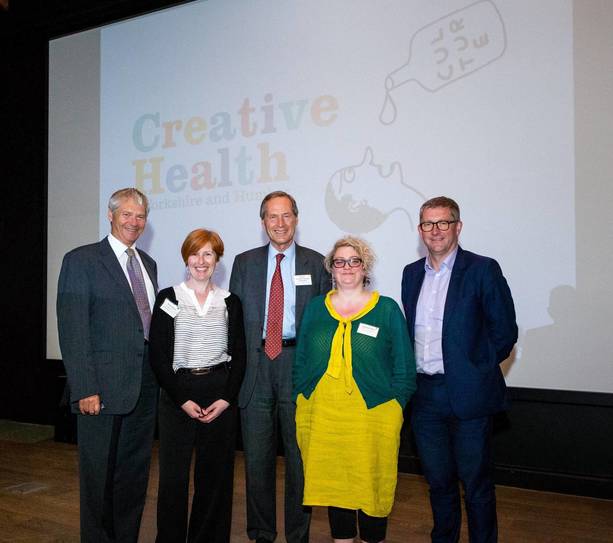Landmark conference calls for arts and health role in City of Culture legacy

Pictured (from left) are Andy Snowdon, Chair of the Hull and East Yorkshire Hospitals NHS Trust’s Charitable Funds Committee; Elaine Burke, an arts and health consultant who has been advising the Trust; Lord Howarth; Deborah Munt, the Yorkshire and Humber representative on the new Culture, Health and Wellbeing Alliance; Dr Matt Walsh, Chief Officer, NHS Calderdale CCG.
KEY figures from the Yorkshire and Humber cultural and health sectors are being urged to take a lead and establish the arts and health as a cornerstone of Hull’s UK City of Culture legacy.
Delegates attending a landmark conference at Hull Royal Infirmary were told to use their influence and expertise to share the common sense and compelling evidence behind the message that the arts and culture can improve wellbeing and save money in the NHS.
The call came from Lord Howarth of Newport, Co-Chair with Ed Vaizey MP of the All-Party Parliamentary Group (APPG) on Arts, Health and Wellbeing, at the regional unveiling of their Creative Health report.
The event was hosted by the Yorkshire and Humber representative of the new Culture, Health and Wellbeing Alliance and Hull and East Yorkshire Hospitals NHS Trust, which seized the opportunity to launch its own arts strategy covering Hull Royal Infirmary and Castle Hill Hospital.
The APPG report is based on more than two years’ research among experts from the arts and culture, health and social care, local government, academia and service users.
Key findings include:
- Music therapy reduced agitation and need for medication in 67 per cent of people with dementia
- Arts therapies including drama, music and visual arts activities are offered to individuals by 3,600 practitioners accredited by the Health and Care Professionals Council.
- Arts-on-prescription, which involves people experiencing psychological or physical distress engaging with arts in the community, has shown a 37 per cent drop in GP consultation rates and a 27 per cent reduction in hospital admissions, generating a saving of £216 per patient
The report also highlights Strokestra, a pilot collaboration between the Royal Philharmonic Orchestra and Hull Integrated Community Stroke Service within Humber NHS Trust. Sessions ranged from percussion to conducting and culminated in a live orchestral performance. Evaluation by Stroke Impact found that 86 per cent of patients reported improved sleep, reduced anxiety, dizzy spells and epileptic episodes, improved concentration and memory and increased confidence, morale and sense of self.
Lord Howarth said the APPG was set up against a background of dedicated health and social care professionals struggling at a time of inadequate funding and intensifying social pressures.
He said: “There is too much anger within our society, a coarseness in relationships and an epidemic of mental illness. We remain by many standards a rich society yet we starve our health services and social care system of resources. What a perversity of values!
“We need to work to create a healthy and health-creating society. The system we have is not sustainable financially or culturally. The APPG was set up to assess the state of arts and culture in health and social care and to make the case for the further development of its role.”
Lord Howarth said the conference, the fourth of nine taking place nationwide to roll out Creative Health, could kick-start a “festival of ideas”.
He told the audience of arts and health, healthcare, education and local authority professionals: “You are leaders in the work that you do. You have the expertise and the influence and you are capable of being effective in the structural and cultural changes that are needed.
“The work is important because of the specific measurable benefits that we are able to demonstrate in the report. People told us about the transformational effect of arts and culture with sickness and disability and what improvements it had made to their lives. I hope arts and health will be as valuable a legacy arising from Hull’s role as City of Culture as any other they might conceive.”
At the heart of the national and local initiatives is the mounting evidence that the arts and culture offer an important additional resource for achieving health and wellbeing, and that more investment in fresh and innovative thinking and cost-effective methods can improve the quality of experience and ease the pressure on health services.
Andy Snowdon, Chair of the Trust’s Charitable Funds Committee, said: “Our arts strategy sets out our long-term commitment to increasing benefits for patients and our staff, working with community groups and individuals. We feel we have a responsibility to show some leadership in this area because we believe in the value and importance of the arts and culture.”
Elaine Burke, an arts and health consultant who has been advising the Trust, said the local strategy will build on the proven benefits that the arts bring to health.
She said: “It is about creative thinking and creative ways of doing. We want to make sure that all our hospital spaces, inside and outside, make people feel better. It is really exciting that the Trust and the leadership team are fully behind this.”



























